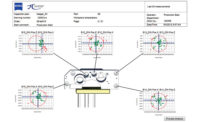BIRMINGHAM, UNITED KINGDOM-Donald Welbourn, a pioneer of computer-aided design and computer-aided manufacturing (CAD/CAM) research and development in the United Kingdom, has died at the age of 93. Welbourn’s work led to the creation of Delcam, supplier of machining software, and contributed to the establishment of Cambridge University as a major center for CAD/CAM research.
Welbourn first became aware of the potential of computer-aided manufacturing in 1965, and by the end of the year, the UK Science Research Council had awarded Cambridge University’s Engineering Department (CUED) a grant of £65,000 with which to start work on CAD.
From the start, the research concentrated on 3-D design, unlike other systems of the time, which were being developed purely for 2-D drafting. During his time in industry, Welbourn had become aware of the problems experienced by toolmakers that were working from 2-D drawings. These were frequently ambiguous when describing complex 3-D models, and Welbourn believed that 3-D computer models could provide a more reliable solution.
In 1974 Welbourn persuaded the late Lord Caldecote, chairman of the Delta Group plc and a former member of the CUED staff, that his companies must get involved with computer-aided engineering, which eventually led to the formation of Delcam in 1989.
Welbourn retired from the university in 1983, but continued to play an active role as a fellow of Selwyn College and in supporting Delcam. Welbourn attended most of the company’s annual sales partner meetings, where he gave regular presentations on his pride at seeing that such a large and successful company had developed from his initial ideas.
Donald’s wife Esther, fellow of New Hall, Cambridge, predeceased him in 2001. He leaves a daughter, Ann, and a son, Hugh.
Get our new eMagazine delivered to your inbox every month.
Stay in the know with Quality’s comprehensive coverage of the manufacturing and metrology industries.
SIGN UP TODAY!Copyright ©2024. All Rights Reserved BNP Media.
Design, CMS, Hosting & Web Development :: ePublishing
